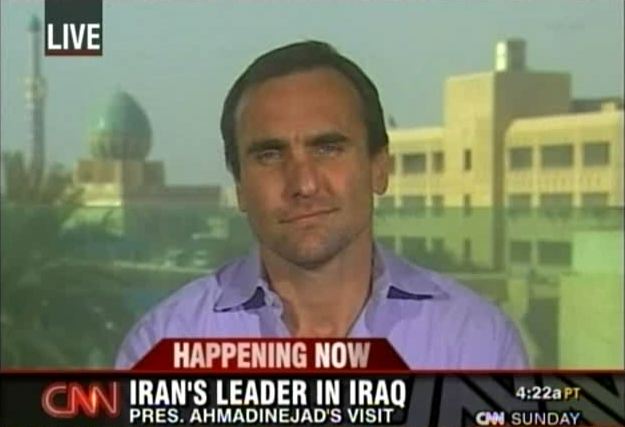SAM: "This is a statement by Iran."

Length: 4:29
LARGE (52.7 MB) ----- SMALL (5.4 MB)
Michael is on Sunday Morning about 20 minutes after the International clip, detailing the significance of the Iranian president's arrival for Domestic viewers. Aneesh Raman also speaks about how Iranian citizens view the trip.
T.J. HOLMES: Well, a visit to Iraq. A historic visit to tell you about from Iran's president.
BETTY NGUYEN: We are live in Tehran and Baghdad and we are going to get a closer look at what this means for the war in Iraq and the race for the White House.
NGUYEN: And while the presidential candidates here debate Iraq, the Iranian president is there right now. Mahmoud Ahmadinejad getting the red carpet treatment on his historic visit. It is the first by an Iranian president to Iraq. And CNN's extensive international services are bringing you the story from both countries. Michael Ware is in Baghdad and Aneesh Raman is in Tehran. Let's first start with Michael. Good morning, Michael.
MICHAEL WARE, CNN CORRESPONDENT: Good morning, Betty. So, yes, what we saw this morning was earlier this morning Baghdad time, President Ahmadinejad touched down at Baghdad International Airport. He stepped from the plane with a presidential wave. He was then put into a motorcade after being met by Iraqi officials and he drove what was once the notorious Airport Road, once the most dangerous piece of highway in this country.
He took that ride and went to the residence of the Iraqi President Jalal Talabani where he held a series of meetings and made his first public statement. Now this trip is so symbolically important in so many ways. Even just driving on the streets and going to the president's residence -- which is not in a heavily fortified Green Zone but is out in what Americans call the Red Zone -- says so much. Let alone these images we're seeing on TV of him walking down a red carpet, brass bands playing national anthems and children giving him flowers. This is a statement by Iran. They are staking their claim here in Iraq. America and Iran are vying for influence in this country. And many people, even in the U.S. mission, will tell you that right now Iran has the edge.
Indeed, some of the most is senior American officials have said to me, "they are the big winners of the past six years." The fact that he can come here is a statement of his confidence. Even the Iranian ambassador just told me last week here in Baghdad, "so many countries even in this region won't even send diplomats yet we send our president." That's how sure they are of themselves and that's how closely aligned this Iraqi government is to them and that's how America at least for today is being left on the sidelines. Betty?
NGUYEN: All right. Michael Ware joining us live, thank you. It is a statement and let's see how things are playing out in Tehran where CNN's Aneesh Raman joins us now. Are people viewing this as indeed the statement that Michael was talking about?
ANEESH RAMAN, CNN CORRESPONDENT: In part, Betty. The people here see this, as Michael mentioned, as largely symbolic. Keep in mind, the relationship between Iran and Iraq began anew quite literally from the moment Saddam Hussein's statue fell some five years ago.
So why is Ahmadinejad going now? Michael hit the top reason. To remind the U.S. that it is Iran, not America, who will have lasting influence over Iraqi affairs. Analysts here suggest he is going in part to bolster support for Iraq's Shia prime minister, Nouri al Maliki, and to refute on the ground the continued claims by both U.S. and Iraqi officials that Iran continues to arm Shia militias.
Now, Ahmadinejad's denials on that front will largely likely fall on deaf ears. But in a broad sense, for a lot of Iranians, this just symbolizes as well both the relationship that has now come between Iran and Iraq, but also the predominance that Iran's President Ahmadinejad has put on foreign policy since coming to office.
A lot of Iranians think he has spent far too much time on foreign issues, on controversial statements to the world and far too little time on fixing this country's floundering economy. Hundreds of millions have been sent abroad. A billion in aid promised to Iraq. Hundreds of millions to Hezbollah in Lebanon. A lot of Iranians say bring that home. The one group Ahmadinejad has really excited about this trip are the extremely religious Iranians. They want increased ties with Iraq because it means easier access to those Shia holy sites within Iraq.
So a mixed bag of sorts among the Iranian people. Clearly symbolic of how much has changed -- they fought, of course, an eight-year battle, a bloody one with Saddam's Iraq -- but again a sign of how much foreign policy has really underlined Ahmadinejad's presidency. Betty?
NGUYEN: And there's a lot that we can delve into here. We're simply out of time. But we do appreciate both of you joining us live this morning. We'll talk to you shortly. Thank you.
